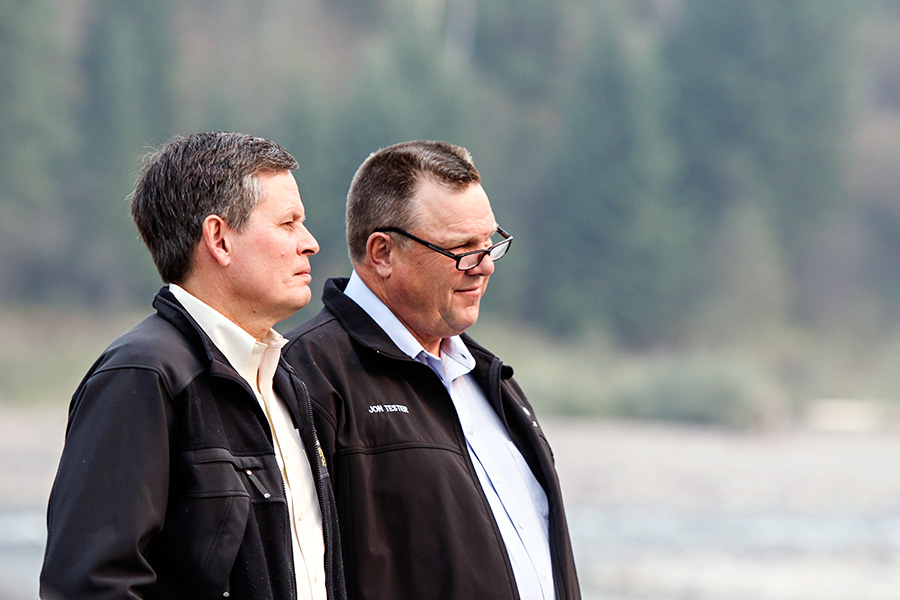President Donald Trump released his $4.8 trillion budget proposal for the upcoming fiscal year this week, rankling public lands advocates by calling for dramatic cuts to the Land and Water Conservation Fund (LWCF), a popular bipartisan program that has been instrumental in protecting and conserving the nation’s public lands, as well as to the National Park Service (NPS).
The proposal includes a 97% cut in discretionary spending on LWCF and $581 million in cuts to the NPS, leaving the programs endangered even as Montana’s congressional delegates pledge their continued support.
Following the release of the Trump Administration’s proposed Fiscal Year 2021 budget, U.S. Sen. Jon Tester, D-Montana, slammed the proposal, which he said performs a disservice to rural America — not only by reducing funding to conservation programs and national parks, but by slashing hundreds of billions of dollars from payments to Medicare providers like hospitals and eliminating the Affordable Care Act Medicaid expansion program.
“We need to tackle wasteful spending and our national debt — which has exploded over the past three years — but this Administration’s irresponsible budget proposal does neither,” Tester, a senior member of the Senate Appropriations Committee, said. “Instead, it funds tax cuts for the wealthy by slashing Medicare and healthcare for rural families, cutting rural infrastructure projects, and decimating our public lands and outdoor recreation economy. Rural America deserves better than to be thrown under the bus as it drives even further into the swamp.”
U.S. Sen. Steve Daines, D-Montana, has emerged as a strong Republican voice for fully funding LWCF, and said he would continue to work to ensure its authorization. A spokesperson for Daines cautioned that the budget put forth by the administration is merely a “blueprint” for spending, and it hinges on congressional approval.
“Congress has the power of the purse and is the body that actually makes the decisions and funds the government,” according to the spokesperson. “As a member of the U.S. Senate Appropriations Committee, Senator Daines will continue fighting for funding of the Land and Water Conservation Fund (LWCF) and other important Montana priorities in the appropriations process.”
Indeed, full and permanent funding for LWCF has garnered support from Montana’s entire congressional delegation, which has emphasized the conservation fund’s role in helping spur the outdoor recreation economy, which continues to outpace overall economic growth across the West.
Conservation and sportsmen groups say failure to fully fund could derail critical projects as development pressures loom.
Last spring, the federal government approved permanent reauthorization of LWCF, and proponents are now urging lawmakers to take the final step to ensure the full $900 million is permanently marked for LWCF projects and is actually placed in the fund each year.
Still, despite wide support for LWCF, it has only received full funding once in its history, and proponents are pushing lawmakers to pass legislation to authorize annual allocations of up to $900 million — the full amount allowed.
“LWCF was permanently reauthorized in 2019 with passage of the strongly bipartisan public lands package,” said Land Tawney, president and CEO of Backcountry Hunters and Anglers. “Legislation that would ensure permanent and dedicated funding for LWCF is gaining momentum in Congress even now. Clearly, the citizenry has spoken, with a compelling majority supporting our best program for enhancing opportunities to access great places to hunt and fish. The administration’s decision to ignore the will of the people, while simultaneously soliciting their input, deserves an explanation.”
First established by Congress in 1965, LWCF is funded by offshore oil and gas royalties rather than taxpayer dollars and provides hundreds of millions of dollars in funding to protect public lands and increase access to outdoor recreation, which sustains an estimated 71,000 Montana jobs and generates more than $7 billion in economic activity statewide every year.
The outdoor recreation sector’s role as a prominent economic driver has been a major factor in building support, and some business leaders called on Republican leaders to fight for full funding.
“Our elected officials have stood by long enough, and it is time for the Montana leaders in the majority party to take this conservation funding seriously, provide some certainty for Montana’s outdoor recreation economy, and fight to fully fund the Land and Water Conservation Fund,” said Marne Hayes, executive director of Business for Montana’s Outdoors. “Montana businesses are tired of waiting.”
Locally, LWCF proponents say the importance of the federal program is evident in the suite of conservation projects that are nearing completion or have recently come to fruition in the Flathead Valley, including land acquisitions and grants to state and local entities for everything from conservation easements to municipal parks.
For example, it recently helped complete the next phase of a 13,400-acre conservation easement northwest of Whitefish Lake, providing $2 million for the final piece of the multi-phased Whitefish Lake Watershed Project, which helps protect wildlife, promote timber production, and allow public access for hunting, fishing, hiking, mountain biking, and other outdoor pursuits.
